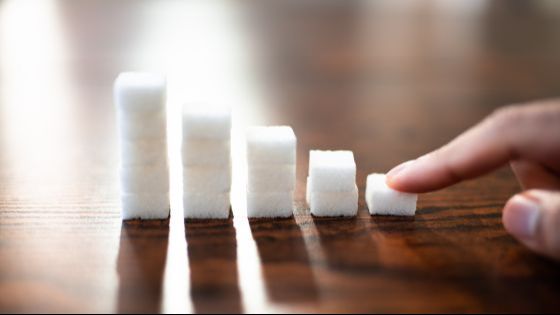
Blood Sugar, Belly Fat & Hormones: The Hidden Role of Insulin Resistance
Jun 30, 2025You know that feeling when your body just isn’t cooperating? The weight won’t budge, your energy crashes mid-afternoon, your mood feels like a rollercoaster, and your skin starts acting like a teenager’s. You might think it’s just “hormones” doing their unpredictable thing, but what if I told you that a hidden culprit could be behind the chaos?
Most people associate insulin resistance with diabetes, but its impact on hormonal balance extends far beyond blood sugar levels. In fact, insulin regulates almost every other hormone in your body. When it’s out of whack, it can throw off estrogen, testosterone, cortisol, thyroid function - you name it.
But here’s the good news: once you understand how insulin resistance affects your horm
...This is premium content. You can unlock this content by registering as a member.
You know that feeling when your body just isn’t cooperating? The weight won’t budge, your energy crashes mid-afternoon, your mood feels like a rollercoaster, and your skin starts acting like a teenager’s. You might think it’s just “hormones” doing their unpredictable thing, but what if I told you that a hidden culprit could be behind the chaos?
Most people associate insulin resistance with diabetes, but its impact on hormonal balance extends far beyond blood sugar levels. In fact, insulin regulates almost every other hormone in your body. When it’s out of whack, it can throw off estrogen, testosterone, cortisol, thyroid function - you name it.
But here’s the good news: once you understand how insulin resistance affects your hormones, you can start making the right changes to bring everything back into balance. And trust me, when you do, you’ll feel the difference!
So let’s dig in. What exactly is insulin resistance, and why is it hijacking your hormones?

What Is Insulin Resistance?
In simple terms, insulin resistance happens when your body’s cells stop responding to insulin (a hormone produced by the pancreas that helps regulate blood sugar). Think of insulin as a key that unlocks your cells, allowing glucose (from the food you eat) to enter and be used for energy. When everything is working smoothly, your blood sugar stays balanced, and your body functions optimally. But when you’re insulin resistant, those cells essentially change the locks.
The result? Glucose stays stuck in your bloodstream, and your pancreas pumps out even more insulin to compensate. Over time, this leads to chronically high insulin levels. And when insulin levels stay elevated for too long, it sets off a metabolic domino effect that disrupts everything, including your hormones. PMID: 29939616

What Causes Insulin Resistance?
It’s not just one thing—it’s usually a mix of factors, including:
1. Diet high in processed foods & sugar
- Consuming too many refined carbs and ultra-processed foods can repeatedly spike blood sugar levels, leading to insulin overproduction and eventual insulin resistance.
2. Sedentary lifestyle
- Muscle cells are among the largest users of glucose. When you don’t move enough, your body becomes less efficient at processing it.
3. Chronic stress
- Elevated cortisol levels increase blood sugar levels, exacerbating insulin resistance.
4. Environmental toxins
- Endocrine disruptors (like BPA and phthalates) can interfere with insulin signaling.
5. Genetics
- Some people are more prone to insulin resistance, but lifestyle still plays a huge role.

Signs and Symptoms of Insulin Resistance
You don’t need a lab test to know something’s off. Insulin resistance shows up in everyday struggles like:
- Fatigue – That “wired but tired” feeling, especially after meals.
- Sugar cravings – If you need something sweet after dinner, insulin resistance may be to blame.
- Weight gain (especially around the belly) – Even if you’re eating “healthy,” stubborn fat around the midsection can be a red flag.
- Brain fog – Struggling to focus or remember things? Insulin resistance can mess with cognitive function.
- Skin issues – Dark velvety patches (acanthosis nigricans), frequent breakouts, or skin tags are all signs.
Sound familiar? Don’t worry, insulin resistance can be reversed. But before we delve into how, let’s examine how it disrupts your hormonal balance in ways you might not expect.
1. Insulin Resistance and Cortisol (The Stress Hormone)
Stress can lead to cravings for carbs, contribute to belly fat accumulation, and leave you feeling exhausted. This is due to cortisol and insulin working together in a detrimental manner.
Chronic stress increases cortisol, which signals your liver to release more glucose into the bloodstream—just in case you need energy to “run from danger” (even if the only danger is your inbox). But if you’re insulin resistant, your body struggles to clear that extra glucose, so insulin levels rise even higher. The result? More fat storage (especially around the belly), unstable energy levels, and feeling tired but wired.
Long story short: stress fuels insulin resistance, and insulin resistance fuels stress, a vicious cycle that leaves you feeling exhausted, anxious, and craving sugar like it’s a lifeline.
2. Insulin Resistance and Estrogen & Progesterone (Female Hormones)
Ladies, if your periods have become irregular, heavier, or unbearable, insulin resistance may be contributing to the issue.
Insulin resistance is linked to estrogen dominance, meaning estrogen levels become too high relative to progesterone. This can lead to PMS, heavy or irregular cycles, and conditions like PCOS, fibroids, and endometriosis. At the same time, progesterone (a calming, mood-supporting hormone) tends to drop when insulin is high, making anxiety, poor sleep, and mood swings even worse.
3. Insulin Resistance and Testosterone (Men & Women)
Too much testosterone or too little, either way, insulin resistance has its fingerprints all over it. In women, insulin resistance raises testosterone, which can lead to classic PCOS symptoms:
- Facial hair growth (hirsutism)
- Thinning scalp hair
- Acne (especially around the jawline)
- Irregular or absent periods
In men, insulin resistance does the opposite—it lowers testosterone, which can cause:
- Low libido
- Fatigue
- Loss of muscle mass
- Increased body fat
If you’re struggling with symptoms of high or low testosterone, don’t just focus on hormone replacement; start with insulin.
4. Insulin Resistance and Thyroid Function
High insulin levels contribute to hypothyroidism (slow thyroid function) and increase the risk of autoimmune thyroid conditions like Hashimoto’s thyroiditis. Insulin resistance also slows down the conversion of T4 (inactive thyroid hormone) to T3 (active thyroid hormone), meaning your metabolism and energy levels take a hit. A sluggish thyroid makes weight loss harder and contributes to brain fog, cold hands and feet, and constipation.
5. Insulin Resistance and Leptin & Ghrelin (Hunger Hormones)
Ever feel hungry right after you just ate? Or like you could eat an entire pizza and still not feel full? That’s your hunger hormones, leptin and ghrelin, going rogue, thanks to insulin resistance.
Leptin resistance occurs when the brain fails to receive the “I’m full” signal, resulting in persistent hunger, cravings, and overeating. Ghrelin (the hunger hormone) stays elevated, making fasting and portion control a struggle. The result? You feel like you have zero willpower when, in reality, your hormones are driving the cravings.

How to Improve Insulin Sensitivity and Restore Hormonal Balance
The good news is that insulin resistance isn’t a life sentence, you can reverse it with the right lifestyle changes. It starts with nutrition: focus on whole foods, fiber, healthy fats, and lean proteins to keep blood sugar stable. Ditch the processed carbs and excess sugar, and add insulin-supporting foods like cinnamon, apple cider vinegar, and magnesium-rich leafy greens.
Exercise is another non-negotiable. Strength training helps your muscles soak up glucose more efficiently, while walking after meals can lower blood sugar spikes. Just be mindful of excessive HIIT, which can sometimes add more stress than benefit.
Speaking of stress, managing cortisol is key—chronic stress makes insulin resistance worse, so incorporating mindfulness, deep breathing, or time in nature can help. And don’t overlook sleep, aim for 7-9 hours, and reduce blue light exposure at night to keep your hormones in check.
Conclusion
When insulin is out of balance, it creates a ripple effect across your entire endocrine system, making it harder to feel energized, maintain a healthy weight, and have balanced hormones. Remember, you can turn things around, though. Small, sustainable changes, such as improving your diet, prioritizing strength training, and managing stress, can make a significant difference in restoring insulin sensitivity and overall hormone balance.
If you suspect insulin resistance is playing a role in your health, don’t wait for things to get worse. Working with a functional medicine practitioner can help you identify the root cause and create a personalized plan that works effectively for your body. Ready to take the next step? Book a call, and let’s get you back to feeling your best.
Reboot Your Hormone Health Program
Content Copyright © 2025, MBK Cultivate Skin & Nutrition Wellness
PERMISSION TO REPRINT: You may use any items from this article in your print, blog, magazine, or electronic newsletter. However, you must include the following paragraph, including a link to www.mebykatie.com.
"Information courtesy of www.mebykatie.com; Katie Marshall is a certified Medical Esthetician, Acne Specialist, Functional Nutrition Counsellor, Holistic Chef, and Integrative Nutrition Health Coach. Specializing in skin health, gut health, hormone health, and the whole body. The basic premise is that functional nutrition gets to the root of the problem and resolves the actual problem. This differs from conventional medicine, which prescribes multiple meds to deal with symptoms, with little regard for resolving the root cause of the symptoms. Functional nutrition is more personalized, customized, and holistic. My job is to work with your medical team and advocate for you if necessary."
Health/Medical Disclaimer:
The content of MBK Cultivate Skin & Nutrition Wellness, either through these social media pages, websites, or any other materials distributed by MBK Cultivate Skin & Nutrition Wellness, is intended to provide helpful and informative material. Please remember that my personal and professional opinions on these social media pages and websites are solely my own. This site offers skin, diet, fitness, health, and nutritional information and is designed in good faith for educational purposes only. Care has been taken to confirm the information's accuracy and describe generally accepted practices. However, the authors, editors, and publishers are not responsible for errors, omissions, or any consequences from the application of the information in these publications and make no warranty, expressed or implied, concerning the currency, completeness, or accuracy of the publication's contents. It would be best not to rely on this information as a substitute, nor does it replace professional medical advice, diagnosis, or treatment.
I, Katie Marshall, am not a doctor or medical provider and do not provide medical advice. Readers are advised to research and make decisions in partnership with their healthcare provider.
If you are pregnant, nursing, have a medical condition(s) or take any medication(s), please consult your family physician.
Always seek the advice of your family physician or other qualified healthcare providers with any questions you may have regarding a medical condition. Never disregard professional medical advice or delay seeking it because of something you read on my social media pages or websites.
If you have a medical emergency, call your family physician, go to the nearest emergency department, or call 911 immediately. Reliance on any information provided by MBK Cultivate Skin & Nutrition Wellness or Katie Marshall presenting content for publication to these social media pages or websites is solely at your own risk. Administrators and Moderators are not liable for your actions.
Health Canada & FDA Disclaimer:
Health Canada or the Food and Drug Administration have not evaluated the advice and statements on this page.


